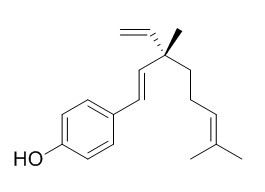Natural Products
Bakuchiol
| Catalog No. | CFN99047 |  |
| CAS No. | 10309-37-2 | |
| Molecular Weight: | 256.4 | |
| Molecular Formula | C18H24O | |
| DBs | [PubChem]:274951460 [ChEMBL]: [PCIDB]:29787 |
Standard InChI:
InChI=1S/C18H24O/c1-5-18(4,13-6-7-15(2)3)14-12-16-8-10-17(19)11-9-16/h5,7-12,14,19H,1,6,13H2,2-4H3/b14-12+/t18-/m1/s1
Biological Activity
Bakuchiol is isolated from the seeds of Psoralea corylifolia, a tree native to China with various uses in traditional medicine, it shows bactericidal effects against all bacteria tested, including S. mutans, Streptococcus sanguis, Streptococcus salivarius, Streptococcus sobrinus, Enterococcus faecalis, Enterococcus faecium, Lactobacillus acidophilus, Lactobacillus casei, Lactobacillus plantarum, Actinomyces viscosus, and Porphyromonas gingivalis, with MICs ranging from 1 to 4 microg/ml and the sterilizing concentration for 15 min ranging from 5 to 20 microg/ml; furthermore, bakuchiol is also effective against adherent cells of S. mutans in water-insoluble glucan in the presence of sucrose and inhibited the reduction of pH in the broth; thus, bakuchiol would be a useful compound for development of antibacterial agents against oral pathogens and has great potential for use in food additives and mouthwash for preventing and treating dental caries.[1]
Bakuchiol analogs, especiallyΔ3,2-hydroxybakuchiol, are monoamine transporter inhibitors involved in regulating dopaminergic and noradrenergic neurotransmission and may have represented potential pharmacotherapies for disorders such as Parkinson's disease, depression, and cocaine addiction.[2]
Bakuchiol and Psoralea corylifolia L. (PCE) treatments reduce postmenopausal bone loss by increasing alkaline phosphatase, Ca concentrations, serum E2 concentration and bone mineral density, and by decreasing the inorganic P level, indicates that bakuchiol and PCE treatments could protect against bone loss.[3]
Bakuchiol is a phenolic isoprenoid with novel enantiomer-selective anti-Influenza A virus activity involving Nrf2 activation.[4]
Bakuchiol is a hepatoprotective compound of psoralea corylifolia on tacrine-induced cytotoxicity in Hep G2 cells.[5]
Bakuchiol derivatives are novel and potent cytotoxic agents.[6]
Product
References
[1] Katsura H, Tsukiyama R I, Suzuki A, et al.Antimicrob Agents Ch, 2001, 45(11):3009-13.
[2] Zhao G, Zang S Y, Zheng X W, et al. Biochem Pharmacol, 2008, 75(9):1835-47.
[3] Lim S H, Ha T Y, Kim S R, et al. Brit J Nut, 2009, 101(7):1031-9.
[4] Shoji M, Arakaki Y, Esumi T, et al. J Biol Chem, 2015, 290(46):28001-17.
[5] Cho H, Jun J Y, Song E K, et al. Planta Med, 2001, 67(8): 750-1.
[6] Majeed R, Reddy M V, Chinthakindi P K, et al. Eur J Med Chem, 2012, 49(1):55-67.
[7] Jeong M, Hong T, Lee K, et al. J Aoac Int, 2015, 98(4):902-6.
Product Use Citation





